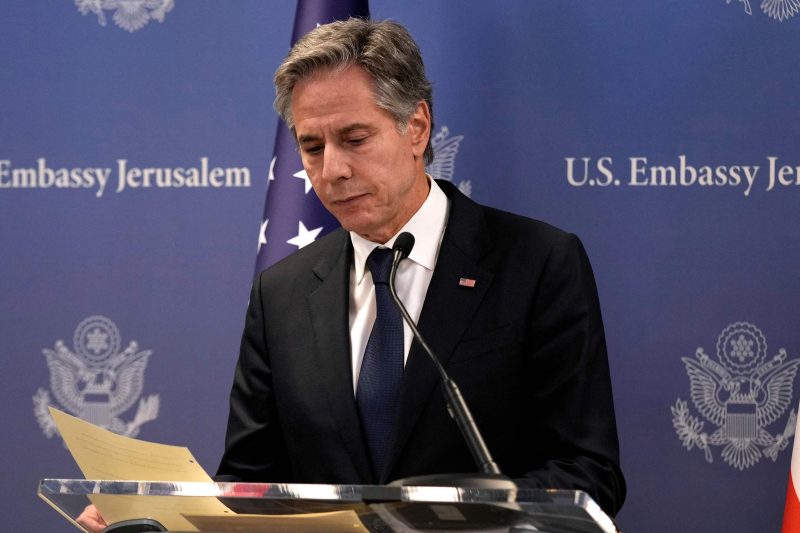President Biden will travel to Israel on Wednesday, the White House said, in a dramatic show of support for the country after Hamas killed more than 1,400 Israelis in a terrorist attack — a gesture that comes as Israel is expected to imminently launch a hard-hitting retaliatory ground invasion of Gaza that has raised humanitarian concerns.
Biden will also visit Jordan, where he plans to meet with Jordanian King Abdullah II, Egyptian President Abdel Fatah El-Sisi and Palestinian Authority President Mahmoud Abbas to discuss the humanitarian crisis in Gaza, which has endured Israeli airstrikes that have killed more than 2,700 Palestinians.
Hamas has taken scores of hostages into Gaza, including an unknown number of Americans. Biden will work to get as much information about the hostage situation as possible during his trip, White House spokesman John Kirby said in a briefing with reporters Monday evening.
Kirby emphasized that the United States had not sought assurances that Israel would not launch its ground invasion while Biden was visiting the country. “We’re not dictating terms or operational directions to the Israelis,” Kirby said. “We don’t want to see escalation. We want to make sure humanitarian assistance begins to flow.”
Still, U.S. officials waited to announce Biden’s travel to Israel on Monday night until they received commitments from Israeli Prime Minister Benjamin Netanyahu on a humanitarian package, according to two U.S. officials familiar with the discussions. Secretary of State Antony Blinken received assurances during a marathon meeting in Tel Aviv this week and then made the announcement that Biden would be visiting.
During the 7½-hour meeting, Israeli and U.S. officials set up separate rooms and passed papers between the two sides, negotiating over humanitarian issues including getting aid into Gaza and creating safe zones for Palestinian civilians, said a State Department official, who spoke on the condition of anonymity to describe sensitive discussions.
Though Blinken hailed an agreement on humanitarian issues, his announcement included few details, probably an indication that differences remain between the two allies. The provision of humanitarian aid is sensitive in Israel, especially among far-right politicians tied to Netanyahu who have pressed him to wage a scorched-earth campaign in Gaza in response to the terrorist attack.
The White House is deeply concerned about the conflict spiraling into a broader regional conflagration, and Biden has warned other actors, particularly Iran, not to jump in. His visit to Israel could underline that message.
Officials are also worried that anger in Arab countries, where many citizens have deep sympathy for the Palestinian cause, could boil over and create pressure for their leaders to take action against Israel.
Biden has repeatedly emphasized his support for Israel and said the country has a duty to respond to the horrific attack, in which Palestinian gunmen from Hamas breached Israel’s sophisticated border fence in several places before hunting civilians in their homes and cars and shooting people indiscriminately.
But the president and his top aides have also sought to draw a distinction between Hamas and Palestinian civilians. In recent days, they have stressed their efforts to ensure that humanitarian assistance can flow into Gaza and to secure a humanitarian corridor where Palestinian Americans can leave the densely populated enclave of more than 2 million people, about half of whom are children.
Israel has said its goal is to eliminate Hamas and has urged more than 1 million Palestinians to evacuate northern Gaza to avoid being in harm’s way, an order the United Nations called impossible. It also announced a full siege of Gaza in response to the Hamas attacks, cutting off food, fuel, electricity and water, which human rights groups have said violates international law.
Biden spoke with Sisi on Monday, the White House said, and the two discussed “ongoing efforts to alleviate the worsening humanitarian crisis in Gaza, in coordination with the U.N., Jordan, the Palestinian Authority, Israel, and other regional partners.”
Egypt has helped broker cease-fires between Israel and Palestine during past incursions and plays a critical role in ongoing efforts to secure humanitarian assistance. And on Egypt’s border with Gaza, the Rafah crossing could be the only way out for Palestinians seeking to flee the enclave amid Israel’s bombardment campaign.
Blinken sought to negotiate a deal to open the Rafah crossing to allow much-needed aid in and foreigners and dual nationals out. Following his meeting Sunday with Sisi, Blinken said Rafah “will be opened” so that hundreds of U.S. citizens could have the chance to leave.
But there was confusion over the agreement and the crossing remained closed, deepening frustration and panic among aid groups, who warn that time is running out for wounded and displaced Gazans to receive critical — and, in many cases, lifesaving — supplies.
The planned trip to Israel is in some ways reminiscent of Biden’s visit in February to Kyiv, as he was seeking to dramatically show his support for Ukraine. That trip, too, was aimed at showcasing Biden’s personal support for an ally that had suffered a bloody attack, in Ukraine’s case at the hands of Russia. That visit was kept secret until Biden’s arrival.

